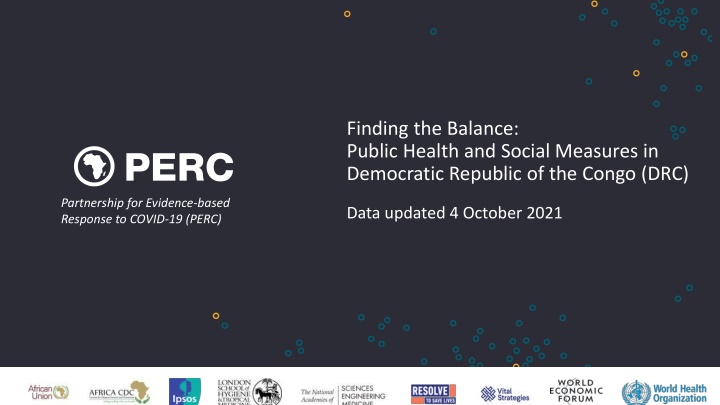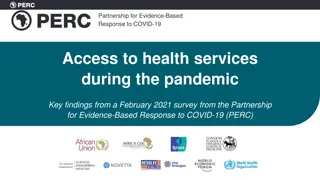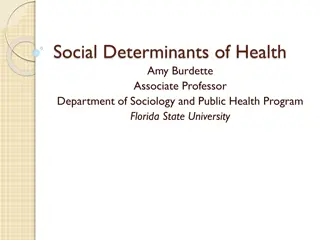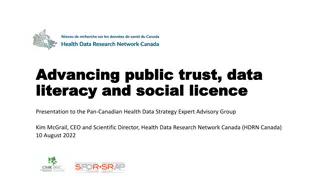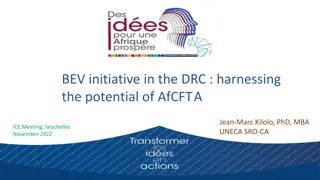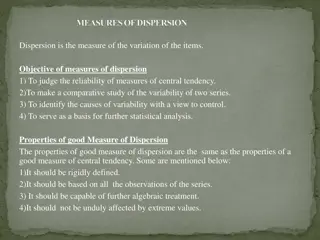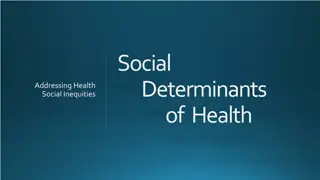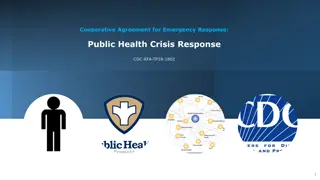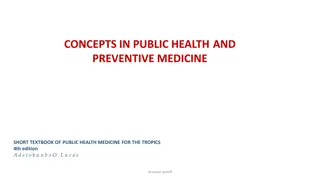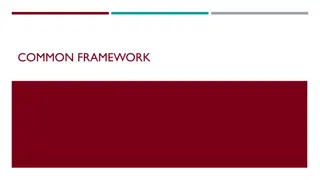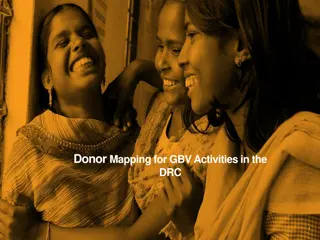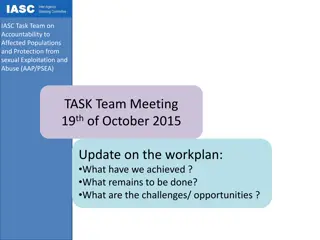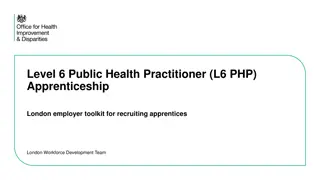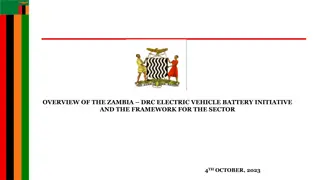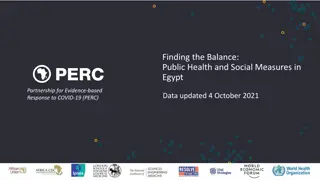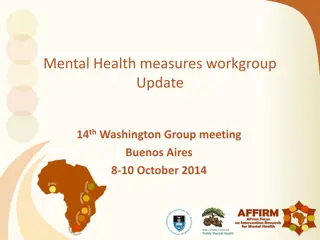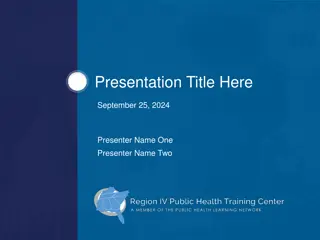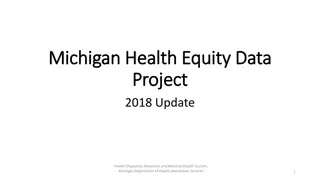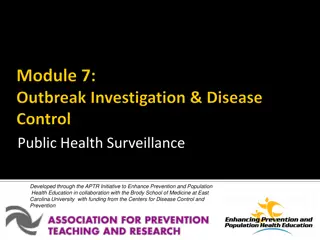Public Health and Social Measures in DRC: PERC Data Update
The Partnership for Evidence-Based Response to COVID-19 (PERC) in Democratic Republic of the Congo (DRC) collects data to assess the impact of COVID-19 and the effectiveness of public health measures. Findings include insights on disease dynamics, PHSM support, risk perceptions, vaccine beliefs, and secondary burdens. Highlights reveal challenges faced by DRC during the pandemic, such as the impact of outbreaks and conflicts on response efforts, low risk perceptions, and persistent economic struggles. Despite some positive trends in vaccine uptake intentions, there are still barriers to vaccination and access to basic needs.
Download Presentation

Please find below an Image/Link to download the presentation.
The content on the website is provided AS IS for your information and personal use only. It may not be sold, licensed, or shared on other websites without obtaining consent from the author.If you encounter any issues during the download, it is possible that the publisher has removed the file from their server.
You are allowed to download the files provided on this website for personal or commercial use, subject to the condition that they are used lawfully. All files are the property of their respective owners.
The content on the website is provided AS IS for your information and personal use only. It may not be sold, licensed, or shared on other websites without obtaining consent from the author.
E N D
Presentation Transcript
Finding the Balance: Public Health and Social Measures in Democratic Republic of the Congo (DRC) Partnership for Evidence-based Response to COVID-19 (PERC) Data updated 4 October 2021
PERC Overview The Partnership for Evidence-Based Response to COVID-19 (PERC) is a public-private partnership that supports evidence-based measures to reduce the impact of COVID-19 on African Union Member States. PERC collects social, economic, epidemiological, population movement and security data from 19 African Union Member States to help determine the acceptability, impact and effectiveness of public health and social measures for COVID-19. This report describes findings from a telephone survey with 1,301 people conducted in September 2021, alongside local epidemiological and secondary data. The survey was approved by Ministry of Health National Health Ethics Committee and is the fourth report from the PERC since the pandemic began.
Table of Contents I. Highlights II. Disease Dynamics and PHSM Implementation III. PSHM Support and Self-Reported Adherence IV. Risk Perceptions and Information V. Vaccine Beliefs and Uptake VI. Secondary Burdens
Highlights and Trend Analysis Ipsos / Resolve to Save Lives : South Africa Partnership for Evidence-based Response to COVID-19
Highlights Situational Awareness: DRC s third wave of new infections began in June '21 and peaked at 370 new reported cases/day before receding in August. While larger than previous waves, the peak caseload only represented four per million people. DRC has faced numerous outbreaks and ongoing conflicts that have complicated COVID-19 response efforts. PHSM Support and Self-Reported Adherence: Since Feb '21, support has fallen sharply for PHSMs the government implemented (and subsequently lifted) during the most recent wave, including restrictions on gatherings and movement. Information and Risk Perception: Perceptions of personal risk of COVID-19 were low, aligning with relatively few reported cases and multiple competing national concerns. Low risk perception was associated with lower support for PHSMs and lower reported likelihood of getting vaccinated. Vaccine Beliefs and Uptake: Vaccine intention, while low compared to average of AU Member States surveyed, was higher than in Feb '21. With 60% of respondents reporting either receiving at least one dose or planning to get the vaccine, results suggest considerable unmet demand among unvaccinated people in DRC, where less than 0.1% of the population has been vaccinated as of 3 Oct '21. Secondary Burdens: High levels of income loss (77%) and missed meals (47%) persisted from previous surveys. Notably, nearly 3 in 4 respondents reported high food prices as a barrier to food access, reflecting nationwide rising food prices since the start of the pandemic.
Survey Trend Highlights Survey 2 Survey 4 Survey 3 Note: Survey 1 conducted in May 2020 is not comparable to the other three surveys because it was fielded only among urban populations, results are therefore not shown here.
Disease Dynamics and PHSM implementation Ipsos / Resolve to Save Lives : South Africa Partnership for Evidence-based Response to COVID-19
Situational Awareness DRC implemented new PHSMs during the peak of new infections in June 2021 before relaxing them in August.
PHSM Support and Self-Reported Adherence Ipsos / Resolve to Save Lives : South Africa Partnership for Evidence-based Response to COVID-19
Individual measures Do people support and follow measures? Support for and self-reported adherence to PHSMs was low in DRC, relative to both previous surveys and other Member States. Support for recently instituted PHSMs, such as restrictions on social gatherings and places of worship, saw especially steep declines, raising concerns around future compliance. Social measures Support for individual measures, such as hand-washing and wearing a face mask, remained at about 90%; however, self-reported adherence has steadily declined since Aug '20. Support for staying home dropped by 10 percentage points since February 2021; support for reducing trips to the market was the lowest among all Member States surveyed, reflecting high levels of concern for both employment and food access. Economic measures Ipsos / Resolve to Save Lives : South Africa Partnership for Evidence-based Response to COVID-19 Partnership for Evidence-based Response to COVID-19 September 2021
Risk Perception and Information Ipsos / Resolve to Save Lives : South Africa Partnership for Evidence-based Response to COVID-19
How do people understand risk? More than half of respondents reported high perceptions of the risk COVID-19 poses to their country; however, perceptions of personal risk from COVID-19 remained low (22%), which is likely the result of low reported caseloads and may be contributing to waning levels of support for measures restricting movement and gatherings. Data Breakdown: Compared to those with high personal risk perception, respondents with low risk perception reported lower levels of support for and adherence to all PHSMs, and were also less likely to report having received at least one vaccine dose or the intention to get vaccinated. Ipsos / Resolve to Save Lives : South Africa Partnership for Evidence-based Response to COVID-19 September 2021
How concerned are people about COVID-19? Income and employment was the most commonly cited concern by every demographic group, while four in 10 listed the virus as one of their top three concerns Ipsos / Resolve to Save Lives : South Africa Partnership for Evidence-based Response to COVID-19 September 2021
Whom do people trust? Satisfaction with the government s response to the pandemic dropped by 13 percentage points since February 2021. Meanwhile, trust in the president s response remained high (81%), but was still eight percentage points lower than in February. Both satisfaction with the government s response to the pandemic and trust in the government institutions were strongly associated with likelihood of getting a vaccine. Thus, there is a risk that eroding trust could threaten DRC s vaccine rollout regardless of improvements to vaccine supply. Ipsos / Resolve to Save Lives : South Africa Partnership for Evidence-based Response to COVID-19 September 2021
Do people believe accurate information? Respondents cited local media both television and radio as the most trusted sources of information on COVID-19. Because local media were both highly trusted and widely used as a source of information on COVID-19 (by 64% of respondents), policymakers should continue efforts to use these platforms to help dispel myths and promote accurate health information, including around PHSMs that have seen decreased levels of support. Data Breakdown: Facebook, Whatsapp and Twitter received the lowest levels of trust among COVID-19 information sources for respondents, suggesting social media may not be the most effective medium for disseminating information about the pandemic. Ipsos / Resolve to Save Lives : South Africa Partnership for Evidence-based Response to COVID-19 September 2021
Vaccine Beliefs and Uptake The aim of these survey questions was to describe the available market for COVID-19 vaccine uptake and target populations for risk communication campaigns. As such, we report on those who likely received or will receive at least one dose of the COVID-19 vaccine, and those who are unlikely to get vaccinated. The survey does not seek to validate administrative COVID-19 vaccine coverage estimates. Ipsos / Resolve to Save Lives : South Africa Partnership for Evidence-based Response to COVID-19
Do people want to get the COVID-19 vaccine? Although respondents in DRC reported higher levels of vaccine intention (60%) than in February (52%), it was still among the lowest levels of Member State surveyed. Still, with the government reporting less than 0.1% of the population already vaccinated, results suggest a large portion of the population would like to get a vaccine if given the opportunity. Ipsos / Resolve to Save Lives : South Africa Partnership for Evidence-based Response to COVID-19 September 2021
What do people think about COVID-19 vaccines? Nearly half of respondents said they wanted more information about different vaccine types and how they work, as well as information about eligibility, timing and access. Given high levels of trust in local television and radio, policymakers should continue to utilize these media to share vaccine information and rollout logistics. Among those reporting being unlikely to get vaccinated, lack of information and low perceived risk were listed as the top two reasons, suggesting this group may be amenable to targeted information campaigns that inform the public about vaccines and COVID-19 risks. Ipsos / Resolve to Save Lives : South Africa Partnership for Evidence-based Response to COVID-19 September 2021
Secondary Burdens Ipsos / Resolve to Save Lives : South Africa Partnership for Evidence-based Response to COVID-19
Are people skipping or delaying healthcare? Difficulty getting medicines There were notable reductions in the proportion of respondents reporting both barriers to accessing medicine and missed or skipped health visits between Aug '20 and Feb '21; however, this downward trend did not continue in September. Reports of difficulty accessing medication in the past three months rose, while roughly the same proportion of respondents reported missing or delaying health care in the past six months as in February. Skipping or delaying health visits Data Breakdown: Those who lost all their income were nearly twice as likely to report skipping or delaying a health visit than those who had not lost any income since the start of the pandemic (31% vs. 17%). Ipsos / Resolve to Save Lives : South Africa Partnership for Evidence-based Response to COVID-19 September 2021
Are people skipping or delaying healthcare? Preventive care, including check-ups, diagnostic visits and reproductive health care, comprised the top three most commonly missed types of visits, while cost and affordability, followed by health facility disruptions, were the leading reasons for missed visits. Ipsos / Resolve to Save Lives : South Africa Partnership for Evidence-based Response to COVID-19 September 2021
Are people experiencing income loss? Respondents continue to report alarmingly high levels of income loss, with over 3 in 4 reporting losing some or all of their income since the start of the pandemic. Data Breakdown: Starting from low levels in August 2020 (12%), the proportion of respondents reporting receipt of government support has declined with each subsequent survey, reaching just 5% in September 2021. In June, the World Bank and DRC announced a US$250M funding package to help improve access to livelihoods and socioeconomic infrastructure in vulnerable communities in the country. Ipsos / Resolve to Save Lives : South Africa Partnership for Evidence-based Response to COVID-19 September 2021
Are people experiencing food insecurity? Nearly half of respondents reported having to miss to reduce the size of a meal in the past week. Rising food prices, in particular, appear to be causing widespread hardship, with 3 in 4 respondents citing it as a barrier to food access. Data Breakdown: According to World Vision, between Feb '20 and July '21 food prices in DRC rose 10.9%, while real GDP growth stagnated in '20 at -0.1%. DRC continues to house the highest number of food-insecure people in the world, with approximately 27.3 million experiencing high levels of acute food insecurity between Feb and July '21. Conditions are not projected to improve in the near future. 23 23 Ipsos / Resolve to Save Lives : South Africa Partnership for Evidence-based Response to COVID-19 September 2021
